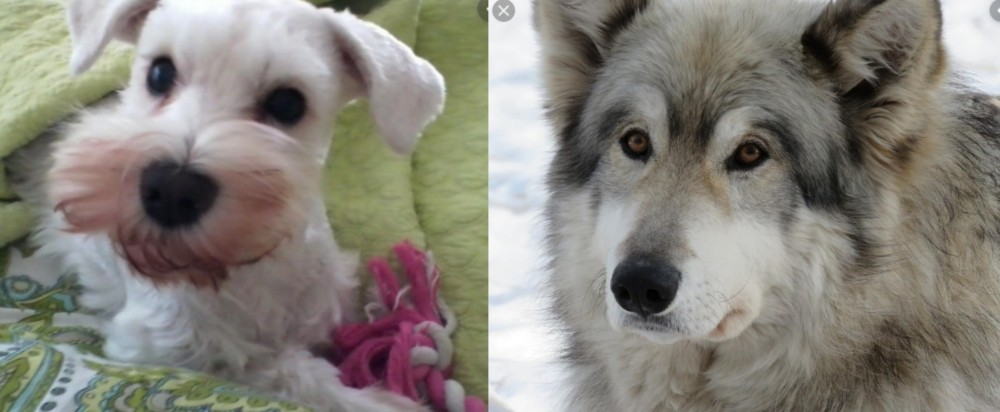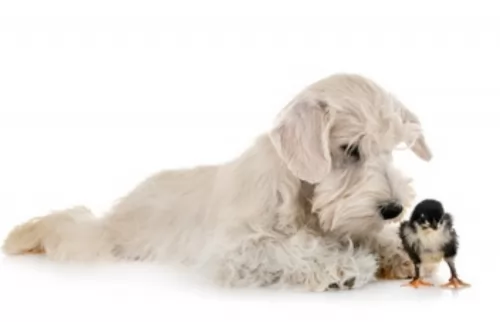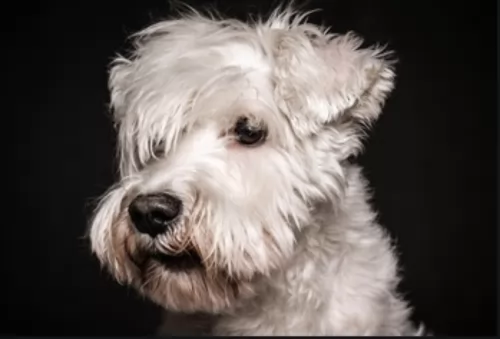 Petzlover
Petzlover Both White Schnauzer and Wolfdog are originated from Germany. White Schnauzer may grow 40 cm / 15 inches shorter than Wolfdog. White Schnauzer may weigh 38 kg / 83 pounds lesser than Wolfdog. Both White Schnauzer and Wolfdog has almost same life span. Both White Schnauzer and Wolfdog has almost same litter size. Both White Schnauzer and Wolfdog requires Moderate Maintenance.
Both White Schnauzer and Wolfdog are originated from Germany. White Schnauzer may grow 40 cm / 15 inches shorter than Wolfdog. White Schnauzer may weigh 38 kg / 83 pounds lesser than Wolfdog. Both White Schnauzer and Wolfdog has almost same life span. Both White Schnauzer and Wolfdog has almost same litter size. Both White Schnauzer and Wolfdog requires Moderate Maintenance.
 The White Schnauzer was established in Germany in 2006 for people looking for this particular breed of dog but in white.
The White Schnauzer was established in Germany in 2006 for people looking for this particular breed of dog but in white.
The traditional color is salt and pepper. It seems that breed societies don’t allow the white breed, saying they don’t conform to the ideal breed standard.
The White Schnauzer is officially recognized in Germany, If you have a White Schnauzer you may not be able to show him with some of the major kennel clubs.
White is one of the four color varieties of the Miniature Schnauzer and it is also recognized by the Fédération Cynologique Internationale.
 The Wolfdog was brought about when domestic dogs were mated with a variety of wolves so as to produce a hybrid.
The Wolfdog was brought about when domestic dogs were mated with a variety of wolves so as to produce a hybrid.
People who want to own these hybrids have to be careful because they find that the unpredictable behavior of their pets makes it difficult for them to care for them.
Then they want to get rid of it. Every year, heaps of these hybrids are abandoned due to humans interfering with nature.
The wolfdog has been bred with a number of dogs but we think about it more in terms of wolf and German shepherd.
 There are a number of different types of White Schnauzer. The white Schnauzer is actually one of 4 color varieties and these dogs are always miniature Schnauzers.
There are a number of different types of White Schnauzer. The white Schnauzer is actually one of 4 color varieties and these dogs are always miniature Schnauzers.
You won’t easily find a Standard- or Giant dog in white. They aren’t albinos, as the skin does have some pigment.
These dogs also have that square-shaped build and they stand between 28 to 36 cm in height and weigh between 4 and 7kg.
The coat is wiry with a soft undercoat. The ears are often cropped to stand erect, but if left they are half-erect, half-floppy and fold forward.
The White Schnauzer is an intelligent dog who will be able to be socialized and trained easily.
He is an energetic little dog and very playful and will get along well with children, loving the games they provide and loving to spend time with all members of his family.
He is loving and affectionate and is willing to share his home and people with other dogs too. He will make you a good watchdog, perhaps encouraged because of his reserve with strangers.
If you provide him with the right amount of mental and physical stimulation, he can become a balanced dog with an amicable personality.
 People mesmerized by the wolf long to bring some of that wildness home, and the wolfdog is supposed to do this.
People mesmerized by the wolf long to bring some of that wildness home, and the wolfdog is supposed to do this.
Their looks differ a lot, even those that come from the same litter. You can’t have a predictable looking wolf dog because it could be any domestic dog bred with a wolf so they display a large variety of appearances.
Most Wolfdogs seem to have smaller heads than pure wolves. The ears seem to be bigger and more pointy.
A popular wolfdog mix is a German Shepherd mixed with the wolf. These dogs can be between 70 to 76cm in height and weigh between 40 and 45kg.
Their coat is thick and can be in colors of grey, cream, red, white, dark brown and black.
While the wolfdog can be trained to become quite a friendly kind of dog, it is not suitable for the first time dog owner. It can show bouts of aggressiveness around strangers and be highly protective of its family.
However, this can be helped with early socialization and training. It is illegal to own the wolfdog in some states. You don’t want to leave a wolfdog alone with your children even though the dog is capable of love and loyalty towards his human family.
 The White Schnauzer is such an adaptable little dog and he will happily adapt to life in the city or in the countryside, just so long as he is close to his human companions and gets sufficient exercise.
The White Schnauzer is such an adaptable little dog and he will happily adapt to life in the city or in the countryside, just so long as he is close to his human companions and gets sufficient exercise.
He is a sociable dog that just loves to be around his human family and won’t like to be separated from them for too long.
He makes a great family dog when you provide him with the right food, a warm dry place to sleep, exercise and lots of love and attention.
 When you add the genes of a wild animal to the pool, you get a crossbreed and when its an animal from the wild, its nature is unpredictable.
When you add the genes of a wild animal to the pool, you get a crossbreed and when its an animal from the wild, its nature is unpredictable.
Many people don’t think about the consequences of what they do when they interfere with nature and the wolfdog gets put down when it behaves like a wild animal and attacks or bites out of defense.
Yes, they can be loyal, loving pets but always you will have the shadow of the dog or wolf’s unpredictable behavior.
There is a reason why these dogs are banned in a number of states. This dog-type-wolf breed is not recommended as a pet at all – take a look at animal shelters and the number of wolf dogs there and ask yourself why.
 While he is a spunky, robust type of dog, there are always going to be some health concerns to look out for.
While he is a spunky, robust type of dog, there are always going to be some health concerns to look out for.
Kidney stones may well not cause your pet the same pain that humans endure, but they are still a cause for concern. A kidney stone that gets too large and lodges in the ureter becomes a ureterolith. This can be very painful, resulting in pain and even vomiting.
The kidney can even swell and become damaged. Your dog could become critically ill, particularly because of the disrupted flow of urine.
Your pet will possibly have blood in the urine, fever, lethargy, poor appetite and weight loss. Veterinary-intervention will be imperative.
 They will also be susceptible to common dog ailments such as parasites and hip dysplasia.
They will also be susceptible to common dog ailments such as parasites and hip dysplasia.
Like any other dog, these Wolf dogs will also possibly develop tumors. He will also need to be vaccinated against harmful diseases and you will need to have a reliable local vet who is interested in your wolf dog.
 He is a low shedding breed so he will require a brushing just once a week. These dogs also have a certain professional grooming cut. Some schnauzer dog owners do stripping but this is mostly for show dogs.
He is a low shedding breed so he will require a brushing just once a week. These dogs also have a certain professional grooming cut. Some schnauzer dog owners do stripping but this is mostly for show dogs.
Most people just have them sheared to make it easy to groom them. Whether stripped or clipped, they nearly always have a beard and bushy eyebrows.
Trim your pet's nails and give him a general once-over during the grooming sessions to ensure all is well.
You White Schnauzer relies on you to make wise food choices for him. He will eat most things you offer him. That doesn’t mean you should as you can cause him to have a whole lot of digestive problems.
If you choose to give him commercially manufactured dog food, make sure its a high-quality one – devoid of toxic ingredients such as colorants, fillers and preservatives.
If you don’t know how to choose, your vet can show you the foods they have in stock and which would suit your pet best.
A little bit of home-made food now and then can also be good, but the food needs to be plain and simple to avoid abdominal pain. Boiled chicken brown rice and vegetables chopped up and added to the dry kibble occasionally can be a very good choice.
 If you own a wolfdog the same care procedures would need to be followed as you would with a regular dog.
If you own a wolfdog the same care procedures would need to be followed as you would with a regular dog.
A wolfdog, however, can’t be vaccinated against rabies. It seems that the reason for this is that it is due to current legislation, and vaccine manufacturers don’t want to support wolf dogs as pets because they are considered to be dangerous.
Provide your wolfdog with highly nutritional, protein-based food. You don’t want to feed your wolfdog any of the low quality, traditional store-bought food high in carbs and artificial additives. Instead, look for a diet rich in proteins and be sure to give this dog some raw meat occasionally.
The dog is active and you will need to provide heaps of exercise for him, both mental and physical activities.
The wolfdog will require training but it will require dedication, though it can be done as the dog is very intelligent.
Even with training, the wolfdog isn’t suited to life in the city but should be kept in the countryside.